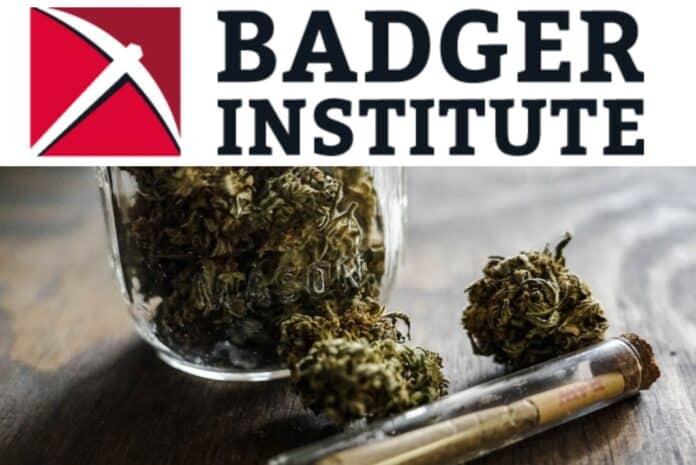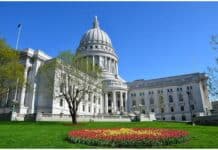The Badger Institute, an ostensibly conservative Wisconsin think tank run by a former Milwaukee Journal Sentinel reporter, appears to be building the case for marijuana legalization here. This comes after the group launched a series of stories pushing “criminal justice reform” in Wisconsin.
Badger’s President Mike Nichols touted the marijuana series as “real facts about pot in Wisconsin” and insisted the group doesn’t have a legalization agenda. “Without coming to a conclusion about legalization or decriminalization or the status quo, at least not initially, the Badger Institute will be releasing a series of policy briefs in the coming months to establish as many relevant facts as possible,” he wrote.
However, we believe that people deserve to know the agenda of the Badger Institute’s marijuana series author, so they can calculate that into their assessment of the series and “facts” presented.
It turns out that Jeremiah Mosteller, the stories’ author and a visiting fellow at Badger, is a vocal proponent of… marijuana legalization and prison reform who works for groups funded by major national figures who are aggressively pushing for legalization, according to his bio under a November 2023 pro-legalization column that he co-wrote for Newsweek.
In November, the Newsweek column described Mosteller as “the executive director of the Cannabis Freedom Alliance,” which is a major pro-legalization group. The Cannabis Freedom Alliance is not mentioned in his Badger biography.
The Cannabis Freedom Alliance was launched by billionaire Charles Koch, rapper Snoop Dogg and “criminal justice reform advocate Weldon Angelos,” according to Politico, which reported that the organization “could change the dynamics of the marijuana legalization debate.” According to Politico, Angelos “served 13 years of a 55-year sentence for marijuana trafficking charges” before being pardoned by former President Donald Trump. In 2021, the alliance released a paper on “cannabis social equity.”
Since his brother died, Charles Koch has become very public about his desires for marijuana legalization and reform. In 2020, The Hill reported that Charles Koch regretted his partisanship. “The 85-year-old libertarian tycoon told the newspaper that after funding conservative causes, he is turning his attention to issues like poverty, addiction, gang violence, homelessness and recidivism,” The Hill reported.
In April, Mosteller was featured at an event called, “National Cannabis Festival: Why Conservatives and Cops want to Legalize Cannabis.” The page touting the event reads, “Come meet the Cannabis Freedom Alliance, who seeks to end the prohibition and criminalization of cannabis in the United States.”
Part 4 in the @badgerinstitute's real facts series on marijuana legalization is out today.
Research from states that have adopted legalization shows lower unemployment, higher workforce participation, and lower workers’ compensation claims.https://t.co/Y27Kt9YUaB
— Jeremiah Mosteller (@jgmosteller) January 5, 2024
Now Mosteller is writing things like this for Badger Institute: “Cannabis legalization might be a policy that many would assume is a negative for a state’s workforce, but our analysis of the limited available research paints a much more complex and positive picture.”
Mosteller is also a senior policy analyst for the Koch-founded Americans for Prosperity, which has an “ad blitz” supporting Nikki Haley. “AFP has continued urging Congress to advance this important legislation and elevating the voices of our activists alongside the Cannabis Freedom Alliance so that state autonomy will be restored,” he wrote on AFP’s website in an article that aggressively pushes marijuana reform because, among other reasons, it leads to racial disparities.
Breaking: The Cannabis Freedom Alliance and Marijuana Justice Coalition have joined together in urging @POTUS to not reschedule cannabis and allow #Congress to pass comprehensive legislation. 1/3@DrugPolicyOrg @ReasonFdn @PoliceForReform @ACLU pic.twitter.com/Dmywkd4fBk
— Jeremiah Mosteller (@jgmosteller) November 2, 2023
We think that there are nuances in the marijuana legalization debate that good people can disagree over. We are fine with having the debate.
What we aren’t fine with is a supposedly conservative institute propping up articles by a paid pro-legalization advocate as neutral agenda-free facts on the topic. We think people have a right to know, especially since Badger has been pushing its series out hard on social media and to legislators.
Wisconsin is at a critical juncture in the marijuana legalization debate right now with legislative Republicans and Speaker Robin Vos working on a medicinal marijuana compromise bill as we speak.
Our concern is that the Badger Institute will not aggressively explore angles on marijuana legalization that don’t fit the legalization agenda.
In 2020, Illinois legalized recreational marijuana. In October the Chicago Tribune wrote about a new study that had found, “The rate of fatal crash drivers who tested positive for marijuana rose from 25% in the two years before legalization to 37% in 2020, the first year of legal recreational sales in Illinois.”
That’s an increase of about 50% in marijuana-related fatal crashes. The report further found that “Michigan, the other Midwestern state to legalize general adult use at about the same time, saw a similar increase, while other neighboring states remained below 24%. The fatal crash rate for weed in Illinois exceeded that for alcohol, which remained at about 35%.”
Mosteller mentioned the study but downplayed its full findings. He did note that traffic crashes rise with legalization but stressed that’s not true in areas with only medicinal marijuana legalization.
In another example, we have not seen a story in the Badger Institute marijuana series fully analyzing the psychotic effects of the drug on people who use it in adolescence.
“There is now reasonable evidence from longitudinal studies that regular cannabis use predicts an increased risk of schizophrenia and of reporting psychotic symptoms,” an article in World Psychiatry found way back in 2008.
In 2022, the American Journal of Psychiatry published an article on the topic that read, “There is recognition of an association between cannabis use and psychosis, but whether the relationship is causal continues to be debated.”
The Chicago Tribune article said, “People hospitalized for cannabis use disorder had a higher prevalence of manic episodes or psychotic disorders. Studies elsewhere have shown a strong association between frequent use and high-potency pot and psychosis, including schizophrenia.”
Will Badger Institute fully explore angles like this?
Here are some facts on Mosteller, who is a senior policy analyst for Americans for Prosperity:
In November, he co-authored the pro-legalization column, which was published by Newsweek, and that contains this line, “We recently sent the president a joint letter reminding him that only the complete removal of marijuana from the federal drug schedules—or descheduling—will fulfill the promise he made during his campaign.” The column’s authors wrote that they appreciated Joe Biden’s “willingness to acknowledge the failures of marijuana prohibition.”
"It now falls upon us to unwind decades of ineffective and harmful marijuana policy. By lifting the federal marijuana ban, states will gain a new and important freedom to shape their own communities." – @weldon_angeloshttps://t.co/hpDfTs5QFH
— Jeremiah Mosteller (@jgmosteller) December 21, 2023
What is the Cannabis Freedom Alliance? According to its website:
“The Cannabis Freedom Alliance (CFA) seeks to end the prohibition and criminalization of cannabis in the United States in a manner consistent with helping all Americans achieve their full potential and limiting the number of barriers that inhibit innovation and entrepreneurship in a free and open market.”
Among legislation pushed by Cannabis Freedom Alliance, which hires lobbyists to push its agenda in Congress: “Ensure individuals who were formerly incarcerated, or current grey-market operators, are given a second chance in society and have an equal opportunity to contribute to cannabis commerce as it transitions from an illicit to legal market.”
Mosteller makes his pro-legalization positions known on X.
His writings indicate that he is a proponent of prison reform. For example, his articles on the Americans for Prosperity website include “5 Missed Chances for Criminal Justice Reform Congress Can Fix in 2022” and “Second Chance Month initiatives can make us more safe, not less” and “This criminal justice solution was well-intentioned. It still failed.”
He previously worked for the Due Process Institute. That group’s website shows it is all-in on criminal justice reform.
What has he done for Badger Institute? His Badger Institute stories on marijuana tilt toward creating a foundation for legalization. For example, he wrote, “On property crime and violent crime, the weight of research shows that for both medical and adult use, legalization has either no impact or a beneficial impact on rates.”
He did note that traffic crashes rise with legalization but stressed that’s not true in areas with only medicinal marijuana legalization.
He found that “early research suggests that full legalization will help reduce the size of the illicit market in cannabis, but those findings aren’t conclusive.”
One of his stories notes, “Wisconsin is seriously considering proposals that would allow the medical use of cannabis — a step that has preceded adult-use legalization in other states.”
Myth: Cannabis has no legitimate medical use.
Fact: Marijuana, or products derived from it, have been found to be effective treatments for health conditions such as chronic pain, sleep apnea, multiple sclerosis, and the negative impacts of chemotherapy. https://t.co/Nr76g5VUj7
— Jeremiah Mosteller (@jgmosteller) July 26, 2022
He found that, “Many counties in Wisconsin have essentially decriminalized the possession or sale of marijuana, and relatively few people who are charged criminally in other counties are ever incarcerated.”
In another article, he wrote, “Making cannabis legal for all adults increases adults’ use of the drug, but evidence on youth use is mixed.”
Again, people can read the articles and assess them how they want.
But they should understand the agenda. Minimally, Badger should have fully disclosed this agenda. They also should have hired a researcher without an agenda or one with a countering agenda to present a fuller picture to the public and to legislators.
We reached out to Nichols with questions and for comment, including about the fellowship’s funding. See Nichols’s response here.










![Governor Caught Playing Politics with Brillion Residents’ Lives & Livelihood [COLUMN] ron tusler](https://www.wisconsinrightnow.com/wp-content/uploads/2025/07/MixCollage-15-Jul-2025-03-35-PM-9568-218x150.jpg)



![Protecting Portland: No Good Deed Goes Unpunished [REVIEW]](https://www.wisconsinrightnow.com/wp-content/uploads/2025/07/portland-218x150.jpg)







